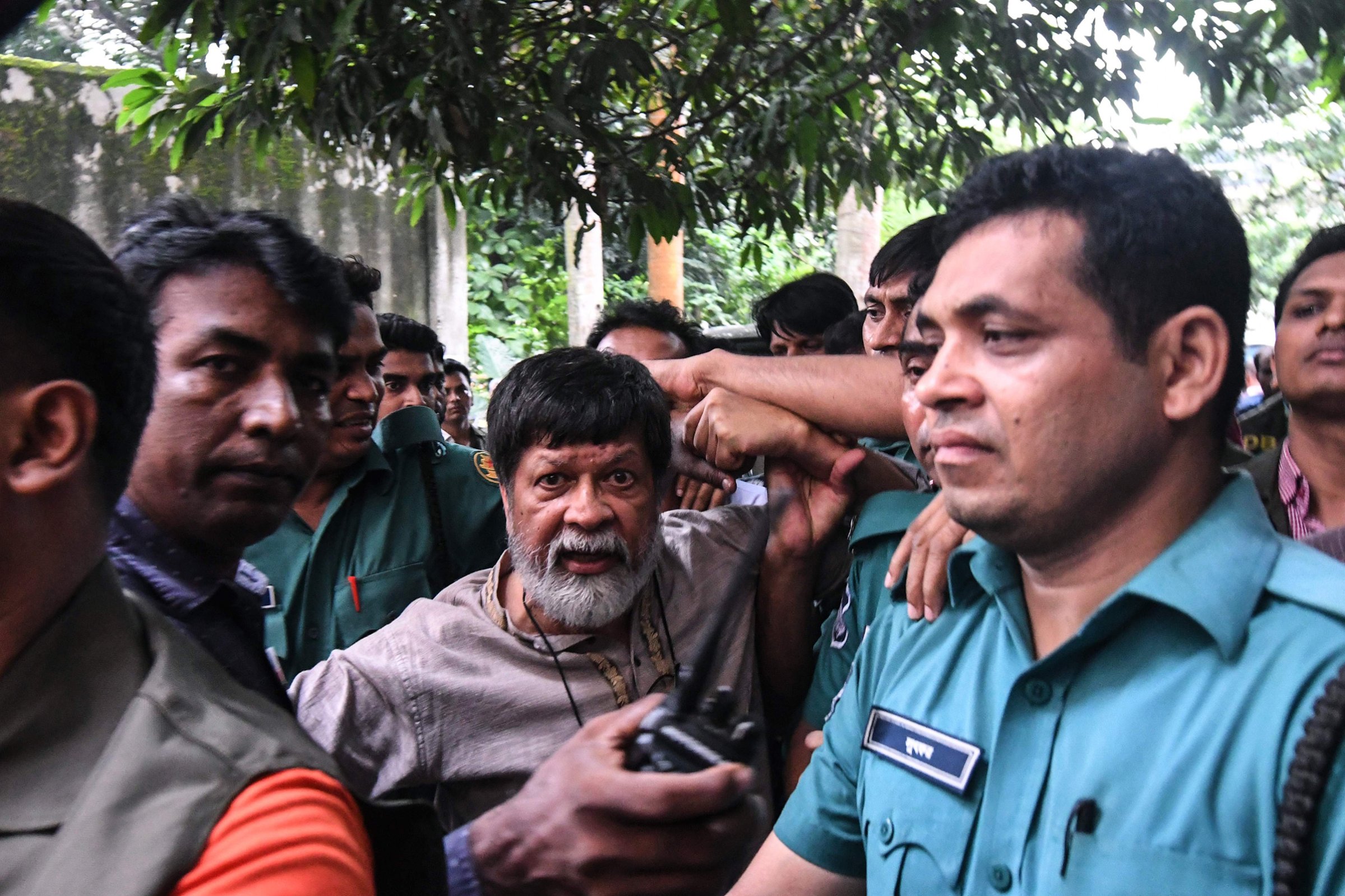
When the acclaimed Bangladeshi photographer Shahidul Alam gave an interview to Al Jazeera on Sunday, he did not have the demeanor of a man who knew he was going to be arrested.
But just hours after the 63 year old finished that Skype interview from his home in the capital, Dhaka, around 20 plainclothes officers turned up and took him away.
On Monday, Alam was officially charged by police for making “provocative comments.” In the interview, he had implied support for the large student protests now into their second week that have paralyzed Dhaka, a city home to 19 million. When Alam appeared in court, a friend said he was unable to walk by himself and showed signs of being beaten up.
The protests started on July 29 after two students were struck and killed by two speeding buses, but, Alam said, had developed into a wider movement against the authoritarianism and corruption of the ruling Awami League.
Reporters Without Borders (RSF) called Sunday a “dark day for press freedom” in Bangladesh, saying that 23 journalists, including Alam, had been attacked while reporting on the protests that day. RSF ranks Bangladesh 146 out of 180 countries in its 2018 press freedom index. Yet dozens of journalists and citizen journalists have been reporting on the increasing violence on the streets of Dhaka despite the danger.
Here’s what Alam’s arrest tells us about press freedom in Bangladesh today.
Why was the photographer arrested?
Alam was charged under section 57 of Bangladesh’s Information Communications Technology Act, which Human Rights Watch says is a “draconian” law used to stifle the media, political dissent and even mild criticisms of the Awami League.
Section 57 allows the prosecution of anyone found to have published material that “tends to deprave and corrupt” its audience, causes a “deterioration in law and order,” or “prejudices the image of the state or a person,” according to Human Rights Watch.
The law was used in the April 2017 arrest of a rubber plantation worker for liking a Facebook post critical of the prime minister, as well as the arrest two months later of a newspaper editor for an article speculating about the nomination of lawmakers.
Despite the existence of this law, Alam was outspoken to Al Jazeera. He described how police had drafted in “armed goons” from the Chhatra League, the Awami League’s youth wing, to attack protesters. “The police are standing by watching it happen,” he said. “In some cases, they are actually helping.”
Have there been similar cases recently?
Just days before the this week’s protests broke out, the former newspaper editor Mahmudur Rahman was “nearly lynched” by the Chhatra League, according to RSF, after leaving a court in western Bangladesh.
Around 100 activists attacked Rahman, severely injuring him with sticks and bricks before he was able to escape. The police “did nothing to protect” him, RSF says.
In June, the secular blogger Shahjahan Bachchu was killed after being ambushed by masked men. He had been threatened for years by radical Islamists, according to RSF. Although the country is officially secular, Islamic militancy is a growing problem—and journalists and bloggers have frequently received death threats.
“There are two issues going on in Bangladesh, the attacks on bloggers, writers and professors by violent extremist groups, and then there’s government crackdowns using Section 57,” says Summer Lopez, the senior director of free expression programs at PEN America, a writers’ advocacy group. “Part of the challenge is that the Bangladeshi government has criminalized much of the speech that individuals are being attacked for by extremists, which undermines their efforts to tackle extremism.”
Do the Dhaka protests have anything to do with freedom of expression?
Asked by Al Jazeera whether the student protests were simply to do with road safety or something larger, Alam replied “Very much larger.” He cited the “gagging of the media,” as well as problems with the banks, extrajudicial killings, corruption and the need to pay protection money as reasons for students filling the streets.
And at least partially, the protests have been fanned by the government’s decision to switch off 3G and 4G mobile data over the weekend. That specifically is a “grave threat to freedom of association and freedom of expression,” Lopez tells TIME.
Has anything improved in recent years?
“The trends have been worsening in the last few years,” says Lopez. “There’s no general climate of free expression.”
But a repressive state apparatus isn’t new for Bangladeshi journalists. The country has consistently been ranked only “partly free” by Freedom House, which ranks the freedom of nations around the world.
Elections will be held later this year and street protests pose an increasing threat to the Awami League, whose victory in the 2014 election was marred by violence that left over 100 dead.
In that election, the League mobilized paramilitary groups to carry out extrajudicial killings and enforced disappearances. The violence prompted the main opposition to boycott the elections, and the League won many seats uncontested with 80% of the national vote.
Whether this year’s election will be characterized by similar violence remains to be seen. “The nearer it gets to elections, the more sensitive they are,” Alam said in his ill-fated interview, referring to the Awami League. “They know if there is a fair and free election they will lose.”
More Must-Reads From TIME
- The 100 Most Influential People of 2024
- Coco Gauff Is Playing for Herself Now
- Scenes From Pro-Palestinian Encampments Across U.S. Universities
- 6 Compliments That Land Every Time
- If You're Dating Right Now , You're Brave: Column
- The AI That Could Heal a Divided Internet
- Fallout Is a Brilliant Model for the Future of Video Game Adaptations
- Want Weekly Recs on What to Watch, Read, and More? Sign Up for Worth Your Time
Write to Billy Perrigo at billy.perrigo@time.com